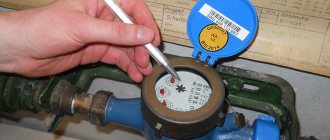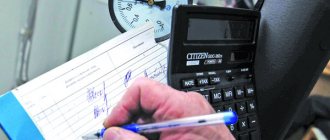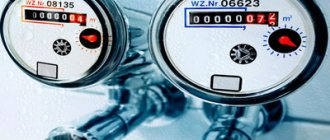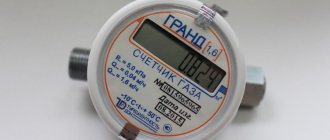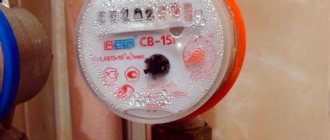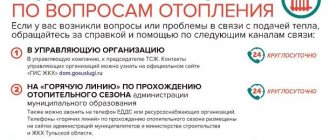Where to go if the hot water supply is not turned on on time?
If the outage is planned, the residents were notified about it in advance, then all that remains is to wait for the completion of the repair work.
The period of annual preventive repairs cannot exceed 14 days , and residents must be notified about this 10 days before the start of work.
If hot water is not provided, you can:
- contact the management company or HOA with a written application or call them by phone;
- call the emergency dispatch service.
The numbers can be found at the information stand at any entrance.
Why, if you have a water meter, do receipts arrive as expected?
This provision applies in several situations. The first of them is when a citizen did not notify the authorized services about the installation of such a device. This entails the absence of the necessary seals on it, and, consequently, information about the device in housing maintenance services. In order to correct this, you need to invite the necessary officials for reconciliation. There is no provision for recalculation in such situations.
The second possible reason is that the water meter has long been “expired” and has not been tested. The situation can be corrected by inviting employees of the management company to take the necessary actions.
In the absence of information about consumption standards in the presence of meters, a fine may be imposed on a citizen in the amount provided for by administrative law.
How to recalculate water bills with installed meters
After the metering device has been installed, it is necessary to invite authorized employees to put seals and make an appropriate decision in this regard. The technician makes a note about the installation of the hot water supply and passes the document to the citizen.
With this document, the consumer must contact the management company and write a statement asking for the rent to be recalculated within a certain period of time.
Employees of the management company cannot refuse to change the fee for a certain period. Otherwise, the citizen has the right to go to court and point out the fact of overpayment for utility bills.
Water recalculation if there are no meters and you were not at home
This occurs in accordance with the above-mentioned Decree of the Government of the Russian Federation. This recalculation occurs when a citizen is absent from the residential premises for more than five days. There should be no breaks in this time period. Such citizens will have to pay for water according to general standards established in a specific region of Russia.
In order to change the amount of payment, a citizen must submit a corresponding application to the management company no later than a month from the date of his actual arrival at his residential premises. Otherwise, he is deprived of the right to receive benefits while he is away from home.
The application must be made in writing. It must be accompanied by evidence that the person was not actually in the residential premises. Some citizens abuse their right and rent out residential premises during their absence. At the same time, they also apply for a reduction in fees. In such situations, the citizen’s actions may be regarded as fraudulent.
What to do if there is no long term?
If there is no hot water for a long time or the water temperature does not meet the standards, then you need to contact the management company or the local housing and communal services department with a written statement.
If there is no result or inaction of the responsible persons, the next step is an application to a higher authority.
The list of institutions for filing complaints about poor quality housing and communal services is established by Art. 13, art. 20 Housing Code of the Russian Federation, clause 124 of Order No. 170.
These are local authorities or government agencies that have the authority to control the provision of quality services to the population:
- District or city administration. This is the first instance where you need to contact in case of inaction of the Criminal Code. It is recommended to write a complaint addressed to the head of the district administration.
Housing inspection. This institution controls all issues related to maintaining the good condition of the housing stock. The right to apply sanctions if it is discovered that services are of inadequate quality.- Government services. To submit a complaint remotely, registration on this portal is required, but not all institutions can be contacted.
- Rospotrebnadzor. Resolves all problems with organizations that violate consumer rights and provide low-quality services. Has the authority to impose sanctions on the violator.
- Prosecutor's office. It is recommended if appeals to all other authorities have not brought results, or there are material claims, for example, a requirement to recalculate payment for services not received
- Court. The last authority that decides cases involving violation of rights and material claims, for example, compensation for moral or material damage. The defendant in the claim must be the organization providing the service.
Receipts are made to confuse us! We understand the payment for utilities from SGK
Payer information
Section: Information about the payer The section contains personal information about the owner of the premises: personal account, information about the area of the apartment and the area for the maintenance of common property, the number of registered.
The area of the home matters when calculating heating fees. In addition, it is taken into account when calculating the payment for hot or cold water, which the house spends on the maintenance of common property. You can read more about this here. After the line “Room area” there is a column “Registered”. It is important for those residents who do not have water meters installed. In such cases, payments for utilities are based on the standard established by the regional government. The standard depends on the number of people registered in the apartment.
The standard is a conditional value that is calculated based on the average human consumption of water, heat, and electricity. Established by the constituent entities of the Russian Federation.
The next line is “Area for the maintenance of common property.” This is a calculated value. How it is calculated: the area of common areas (entrances) is multiplied by the area of the apartment and divided by the area of residential and non-residential premises in the house (the formula for calculation is also prescribed in the Housing Code of the Russian Federation, Article No. 39).
This line is worth paying attention to for residents of houses that do not have a management company (MC) and the accrual for ODN (common house needs) is made by the SGK. For other residents, this information is for reference only; the management company makes payments for the maintenance of common property.
reference Information
Section: Reference information
This section provides general information about the house: the number of residents, the total area of the house, the area of residential and non-residential premises, the total area for the maintenance of common property.
Name of service provider
Section: Artist name class=”aligncenter” width=”1024″ height=”518″[/img]
This section is located in the upper right corner of the receipt. Contains information about the organization that provides utility services: heating, hot and cold water supply, sanitation (in Krasnoyarsk). The line below contains the name and details of the payment recipient - Siberian Heat Sales Company LLC (part of the SGC structure). This organization calculates and collects fees for utilities supplied by SGC enterprises.
Personal account status
Section: Personal account status
This section shows the status of the homeowner’s personal account at the time the receipt is generated separately for each service provided by SGC: heating, hot water (hot water).
In Krasnoyarsk, cold water (cold water) and water disposal (sewage) are additionally indicated.
For each type of service you can see:
- debt at the beginning of the billing month;
- monthly accrual. Where this figure comes from is explained in the receipt below in the “Calculation of the fee” section;
- paid for the month, if payment was made during the billing month;
- amount to be reimbursed (payment compensation according to the limit index)
Compensation of fees based on the maximum index is provided by the Government of the Russian Federation. The limit index is the growth rate for utility bills. If utility services rise in price faster than established by the limit index, then these expenses will be compensated by the regional budget, and the amounts to be reimbursed will appear in the “Amount to be reimbursed” column.
- to pay. This is the amount that was formed by the end of the month, taking into account cash receipts into the account until the receipt was issued;
- penalties. If you do not pay bills on time (by the 10th day of the month following the billing month), then after 31 days of delay, penalties will begin to accrue;
- total. This is the total amount payable taking into account all fees, charges, compensation and penalties. This is what you will need to pay.
Calculation of utility fees
Section: Calculation of fees for utilities class=”aligncenter” width=”1024″ height=”518″[/img]
This section provides the figures by which fees for all utilities from SGC are calculated for the month. Let's look at it in order:
- type of service. All services are identical to those indicated in the “Personal account status” section, with the exception of hot water supply (hot water supply). It is divided into two components: “DHW: coolant” with an open heating supply circuit in the house (or the “Cold water for hot” component - with a closed circuit) and “DHW: thermal energy”. Read more about the differences between closed and open heating systems in the house here.
Important! In Krasnoyarsk, the tariff for hot water consists of two elements: with an open heating supply scheme in the house - “DHW: coolant” and “DHW: thermal energy”, with a closed scheme - “Cold water for hot” and “DHW: thermal energy”.
“DHW: coolant” shows the cost of hot water that has not yet been heated at the CHP to the required temperature with an open heating system.
"Cold water for hot." This is the cost of cold water, which is heated to the required temperature directly in the house.
“DHW: thermal energy” shows how much heat costs to heat hot water to the desired temperature. It is used in closed and open heat supply systems.
These components are calculated on the basis of tariffs established by regional authorities for drinking water and thermal energy required for heating. The standard for heating is set by the Ministry of Housing and Communal Services of the region or was previously established by the local government. You can read more about the cost of hot water in Krasnoyarsk here.
- units. The units of measurement in which the volume of consumption of each utility service is calculated are shown;
- consumption standard. This information is relevant only for those who pay according to the standard. If a common house meter is installed in the house, then it is for reference only and does not participate in the calculation of fees;
- volume of utility consumption. Relevant for those residents who have meters installed. This column shows the volume of consumption of heating, hot and cold water, drainage - according to meter readings;
- rate. The tariffs set by the state (in this case, the Ministry of Tariff Policy of the Krasnoyarsk Territory) for each resource are indicated. If we multiply the volume of utility consumption, we get the amount of payment for utilities.
Reference. With installed metering devices, residents pay only for actual consumption, so they can reduce water or electricity costs if necessary. Read how to do this here.
In the absence of meters, payment occurs according to the standards established by the government of the Krasnoyarsk Territory. The amount of payment depends on the number of people registered in the apartment.
- accrued taking into account the increasing coefficient. This information is for those residents who can install meters in their apartment, but do not do so and continue to pay according to the standard. By law, an increasing factor must be applied to such owners;
- recalculations. The recalculation amount for each utility service is reflected here. Recalculation can be made in case of poor-quality service provided, in case of temporary absence, in case of a change of owner, in case of technical failures, in case of changes in the apartment: change in area, number of registered owners, etc.
- total accrued. This is the sum of all charges and recalculations for utilities for a single apartment.
All tariffs in receipts are set on the basis of regulatory documents approved by the government agency. Tariff is a conditional value that determines how much 1 cubic meter costs. m of water, 1 Gcal of heat, 1 kilowatt of electricity. It is established by a state body - the Ministry of Tariff Policy of the Krasnoyarsk Territory.
Information about recalculations
Section: Information about recalculations
Contains information about all recalculations. Recalculation for housing and communal services is a deduction of previously overpaid funds or an additional payment for the actually consumed resource - both for individual consumption and consumption of the house as a whole.
Consumption volumes according to a common house metering device (CDDU)
Section: Consumption volumes according to a common house metering device (ODPU)
This information is relevant for houses where common house meters for heating and hot water are installed. This section indicates monthly consumption volumes based on readings from public meters. Indications are submitted monthly to the SGC by management companies and homeowners associations. If residents want to get acquainted with meter readings, they must contact their management company or HOA.
Information on individual metering devices (IMU)
Section: Information on individual metering devices (IMU)
This information is intended for those who have water meters installed. Residents who have acquired meters can see the IPU number, the date of verification, the date of the last transmitted readings, the readings of the last month and the last transmitted readings.
Reverse side of the receipt
Reverse side of the receipt
On the reverse side of the receipt you can find a lot of useful information: methods for transmitting readings, ways to pay for utilities without leaving home, like SGK without leaving the couch. In the lower right corner there is useful information depending on the region.
How to file a claim?
There are no uniform requirements for drawing up such a document, but it must be remembered that this is an official document and will be received by an employee of a government agency. The result of the appeal largely depends on how correctly it is compiled.
For this reason, when filing a complaint, you must adhere to certain rules:
the complaint can be written on a regular A4 sheet, since there is no unified form;- The writing style must be formal, polite, you cannot use personal thoughts, threats, or curses;
- the situation must be described briefly but clearly, without inventing anything or adding anything on your own;
- to confirm information, the numbers of laws, regulations, details of contracts or other documents are indicated;
You will need to provide all available evidence, for which all supporting documents are attached to the complaint.
It is necessary to put forward demands commensurate with the offense that has arisen.
Procedure for filing a written complaint:
- At the top right is the full name of the organization to which the complaint is being sent, its address, and details. You can write the full name and position of the head of the organization to send a complaint to him.
- Information about the applicant is entered: his passport and contact details. The address to which the response should be sent is required.
- A little lower in the middle of the line is the name of the document, for example, “Complaint about lack of hot water.”
- What follows is a text that clearly states the essence of the case, the reason for the appeal, with references to violated standards and laws. You should write the address of the house, the time of violations, the dates of appeals to various authorities, indicating the names of these institutions. You can enter a claim for late notification or violation of work deadlines.
- There is a requirement to take appropriate measures (eliminate the violation, make a recalculation, organize an inspection, send an order) and bring the perpetrators to justice.
At the bottom there is a signature with a transcript, date, and a list of attached documents . If this is a collective complaint, then all residents of the building must sign it.
It is imperative to indicate what kind of water supply disruption is occurring and how long it has been going on.
You will need to make 3-4 copies of the document, since its copies must be sent to regulatory authorities. One copy remains in the hands of the applicant with a note that the complaint has been accepted for consideration, indicating the date and signature of the person who accepted the complaint.
The complaint can be submitted in person or sent by mail with acknowledgment of receipt.
Mailing is effective if any agency refuses to accept the application. However, this method of handling will require a lot of time.
What to do if payments for cold water have not arrived?
We'll tell you why not all Kirov residents received receipts from Vodokanal and what to do in this case.
— On September 21, instead of a receipt for water, a paper was received with a notification that the MUP Vodokanal did not have information to calculate fees for water supply and sewerage utilities for August 2021. This paper tells us to go and transfer data to Moskovskaya, 32. But the fact is that we already transferred data there at the end of August, but a month later Vodokanal still doesn’t have any data! What does it mean?
Since August 1, 2021, MUP Vodokanal has become a provider of water supply and sanitation services in Kirov. In September, some Kirov residents did not receive receipts from Vodokanal: instead they either received notifications describing further actions, or nothing at all. This happened because the company did not have enough information to charge fees: for example, there were not enough meter readings transmitted. Vodokanal decided not to issue fees according to the standard, but to issue “zero” receipts and collect data.
The city administration described several possible problematic situations and further steps in this case.
1. A homeowners association, a housing cooperative has been created in your house, or the house is served by a management company; a general meeting of owners to switch to direct payments for water supply and sanitation with the resource supply organization has not been held. Until August 1, receipts came from KKS, but for August there was no payment.
This means that the house was transferred to direct payments with KKS without the decision of the residents due to the large debts of the management company, HOA or housing cooperative to the resource supply organization.
But Vodokanal became a service provider only on August 1, so the management company has no debts to it yet, and there are no direct payments. You must contact your management organization for receipts.
If residents want to switch to direct payments with MUP Vodokanal, they need to hold a meeting of owners, and then submit the minutes of the meeting to the sales department of MUP Vodokanal on the street. Profsoyuznaya, 31a.
2. A homeowners association, housing cooperative has been created in the house, or your house is served by a management company; at the general meeting, residents switched to direct payments with the resource supply organization, but there is still no payment for August.
This could happen if the management company (or homeowners' association, housing cooperative) did not transmit to Vodokanal the minutes of the general meeting on the transition to direct payments. Then you need to contact the management company, homeowners association, housing cooperative and submit the protocol to the sales department of the Vodokanal municipal unitary enterprise on the street. Profsoyuznaya, 31a. After this, residents will be issued receipts for water and sewerage.
3. In the apartment building there is no HOA, no housing cooperative, no management company, the building is managed directly by the residents, and the receipts have not arrived.
Vodokanal explains that Kirov Utility Systems may not have provided them with information for calculating fees for such a house, so they ask to send the house manager to the contract department of the enterprise on the street. Profsoyuznaya, 31a.
4. Residents of a private house did not receive a receipt for August from MUP Vodokanal.
In this case, Vodokanal probably also did not receive information for charging fees from KKS. This data must be transferred to the Cash Settlement Center, whose branches are located at the following addresses:
- st. Moskovskaya, 32 (on weekdays from 8:00 to 18:00, without a break for lunch, on Saturday from 9:00 to 14:00, without a break for lunch);
- st. Koneva, 7, building 6 (on weekdays from 8:00 to 17:00, without lunch break);
- microdistrict Raduzhny, st. Industrialnaya, 2 (on weekdays from 8:00 to 17:00, without lunch break).
You can also get advice by calling the hotline: 8 (8332) 27-97-97. A list of documents for calculating fees for private houses is posted on the Vodokanal and RCC websites.
5. Those who have already gone to the RCC office and provided meter readings, but who still have not received payment for August, are asked to simply wait until October: then a receipt should arrive immediately for August and September.
— The fact is that we created new personal accounts for former KKS subscribers. The data will be accepted, and next month you will receive a receipt for August and September with the correct data. If suddenly the data does not correspond to reality, then subscribers do not need to panic: everything will be adjusted in the next months, just contact RKTs for a recalculation, explained Vodokanal.
Let us remind you that there are two ways to transfer meter readings to Vodokanal if you receive a “zero” receipt. First, on the website of RKTs LLC, in the “Send testimony” section, you need to enter the personal account number indicated in the receipt for July 2021. After this, readings for the previous period will be displayed and it will be possible to enter new ones. The second way is to come to the offices of RCC LLC on Moskovskaya, 32 or Koneva, 7, building 6.
Data for calculating payment must be submitted by September 30 inclusive. No penalties will be charged for three months, the company added.
Briefly about the main thing:
1. If the house has not switched to direct payments with resource officers, you need to contact your management company, homeowners association, housing cooperative for receipts.
2. If residents want to switch to direct payments with MUP Vodokanal, they need to hold a meeting of owners, and then transfer the minutes of the meeting to the sales department on the street. Profsoyuznaya, 31a.
3. For any questions, you can contact the offices of the RCC, which makes the calculations, or the Vodokanal itself.
If you have questions that you can't find the answer to, ask us and we will try to answer them.
Photo: MUP Vodokanal
On this topic
1124
"We're fine". The Kirov City Hall surveyed residents of houses where they complained about the smell of water
Evidence base
When turning off hot water, the first thing you need to do is record the fact and time of the shutdown.
To do this, you need to contact the utility services, report the lack of water, and find out the reason.
The utility employee usually specifies the reasons or time frame required to identify the causes of the lack of water and correct the problem.
It is advisable to obtain information in writing. This will become an important argument when protecting your interests. To do this, you must submit a written claim.
What else can you do to prove the lack of hot water:
- If there is no accident at the site , but cold water flows from the tap, the applicant has the right to independently measure the temperature. If it is below the norm established by law, which is 40°, then an application is also submitted to the dispatch service to record the non-compliance with the standards.
- The applicant has the right to call a specialist to take measurements and record the violation. By law, the master must arrive no later than two hours from the moment the application is submitted. Based on the results of the inspection, a report is drawn up, one copy of which remains with the applicant.
- If there is no hot water supply all the time , a specialist needs to be called several times. Having several acts in hand, you can contact the management company, where they write an application demanding recalculation and restoration of the standard water temperature.
If the inspection shows compliance with the standards, but the owner of the apartment does not agree with this, an independent examination can be carried out, based on the results of which a report is also drawn up.
The management company must be notified in advance of the date of the examination. You can install a meter equipped with a temperature sensor, but management companies are reluctant to agree to register such devices.
In addition, according to the law, payments are calculated based on the number of cubic meters of water received, and not the amount of heat. Therefore, it is very difficult to use temperature sensor data as evidence in the event of disputes with the management company.
There is no water supply in the apartment, but there is an obligation to pay for it.
A very instructive ruling was made by the Third Court of Cassation of General Jurisdiction on October 19, 2021. In short, its essence is that you should save on paying for housing and communal services only through legal means.
Citizen A. filed a claim with the Vyborg District Court of St. Petersburg against the Proton housing cooperative. In support of his claims, A. indicated that he is the owner of an apartment in a building managed by the Proton housing cooperative.
Since 1993, there has been no cold water in his apartment; requests to Proton regarding the provision of this service to his apartment were left unfulfilled. At the same time, charges for cold water and sewerage are charged on a monthly basis, and his demands for recalculation of the disputed services remain unheeded. "Horror! – readers will say – even the blockade of Leningrad, when residents of the Vyborg region were forced to go to the Neva and Bolshaya Nevka for water, lasted only 900 days. And here – more than 27 years, on a sled and with a yoke!”
We hasten to reassure compassionate and indignant readers - everything is not quite so tragic and not at all so simple.
By the way, what are the claims of citizen A. against the Proton housing cooperative? Maybe he is finally demanding, after 27 years, to provide his apartment with cold water? No, his demands are much more modest. Like, “We don’t need water, give us money.” A. filed a claim against the cooperative to impose the obligation to recalculate utility services (cold water, sewerage) for the period from January 1, 2021 to the present; recovery from the defendant of funds for recalculation of charges for not provided utilities in the form of cold water supply and sanitation, as well as accrued penalties for the period from January 1, 2021 to the present in the amount of 100,000 rubles; on the collection of a fine for non-compliance with consumer requirements.
To maintain the intrigue, let’s first talk about the legal vicissitudes of this case. And then we will reveal all the cards to the reader.
The Vyborg District Court partially satisfied the claim: to recalculate the amount of fees and accrued penalties for cold water supply and sanitation. The other part of the claim must be rejected. It can be assumed that this court decision did not suit either party.
This was followed by an appeal by citizen A. to the city court of St. Petersburg. By the appeal ruling of the judicial panel for civil cases of the St. Petersburg City Court, the court decision regarding the satisfaction of A.’s claim was canceled.
The plaintiff, citizen A. moves to the next level. In a cassation appeal addressed to the Third Cassation Court of General Jurisdiction, A. requests the cancellation of the appeal ruling of the judicial panel for civil cases of the St. Petersburg City Court. Having considered all the materials of the case, the judicial panel of the Third Cassation Court of General Jurisdiction determined: The appeal ruling of the judicial panel for civil cases of the St. Petersburg City Court dated July 15, 2021 is left unchanged, A.’s cassation appeal is not satisfied.
All with twists and turns and dry judicial language. Now let's talk about what it looked like in real life.
Cold water supply in the house is carried out in the traditional way - at the entrance risers, and on the staircases there are apartment outlets with shut-off valves (taps). From this shut-off valve and further the apartment wiring is the duty and responsibility of the apartment owner. Citizen A., since 1993, from the moment of acquiring ownership of this apartment, decided not to burden himself with any duty or responsibility. Sledge, rocker, Bolshaya Nevka? No matter how it is. Tea, we don’t live under blockade. He collected water in his entrance, from his riser, from his shut-off tap. In plastic bottles. He was caught doing such an unconventional activity by the GZHI specialists, who took wonderful “memory photos” of such exotica.
That is, de facto, citizen A still used cold water supply services (albeit in a distorted form). The same goes for wastewater services. But since he does not have an indoor cold water supply, there is nowhere to put the meter. The solution is obvious: if you don’t want to pay according to the meter, pay according to the standard. By the way, according to the standard, citizen A. was in no hurry to pay. From 2013 to June 2021, he accumulated a debt in the amount of 56,223 rubles (remember the statement of claim for the recovery of 100 thousand from Proton).
Another nuance. From the case materials it follows that citizen A. has not paid for not only cold water supply services, but also sewerage services since 2013. We will spare the reader and will not describe how water disposal was carried out in besieged Leningrad. But the GZHI specialists did not provide the court with any interesting photos about citizen A’s use of the drainage system.
The conclusion is sad, but fair: “The law is harsh, but it is the law.” And if a friend wants to “turn on the fool”, and instead of arranging a normal apartment wiring with metering devices, he organizes a circus with plastic bottles, then he will definitely be made a fool. Because every house cat knows that paying according to the standard is many times more expensive than paying according to the meter. And citizen A will have to pay. Definitely.
Author: Nikolay Tikhonov
When can I expect results?
The deadline for responding to citizens' appeals regarding poor-quality provision of utility services according to the law is no more than 3 days.
This is stated in paragraphs. “k” clause 31 of the Rules for the provision of public services (Resolution No. 354).
Consideration of an application requesting recalculation of the cost of services provided takes no more than 10 days (Article 31 of the Law on the Protection of Consumer Rights)
The response from the prosecutor's office will need to wait no more than 15 days , after which the applicant will receive written notification of the results of the prosecutor's inspection or the imposition of administrative penalties. Sometimes the period for consideration of an application is extended to 30 days.
After receiving the statement of claim, the court conducts a pre-trial inspection within 5 days. After this, the case will be put in a queue for consideration, a date will be set, and the plaintiff and defendant will be invited to the hearing. The result will be a court decision that comes into force one month after its adoption.
What is housing payment?
Based on [1] Housing Code of the Russian Federation, payment for cold and hot water is included in the section for payment of utilities along with payment for gas supply, sewerage, and electricity consumption in the apartment.
The charging scheme is regulated by standard indicators and formulas for calculating how much to pay for water, established[2] by Resolution No. 354 of the Government of the Russian Federation. Based on these documents, payment is calculated based on the number of registered people in the absence of an apartment meter.
Until January 2021, this was the case - payments for water supply and sanitation were not charged if no one was registered in the apartment and no one lived in it. After this date, changes were made to [2] Resolution No. 354, and payment is calculated regardless of registration and residence according to the standard for the number of owners.
Now the widespread opinion that if no one is registered in the apartment and there is no water meter, then the service is reset, is not true. To implement this option, the apartment owner needs to do a lot of work to collect evidence.



